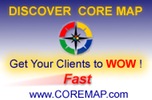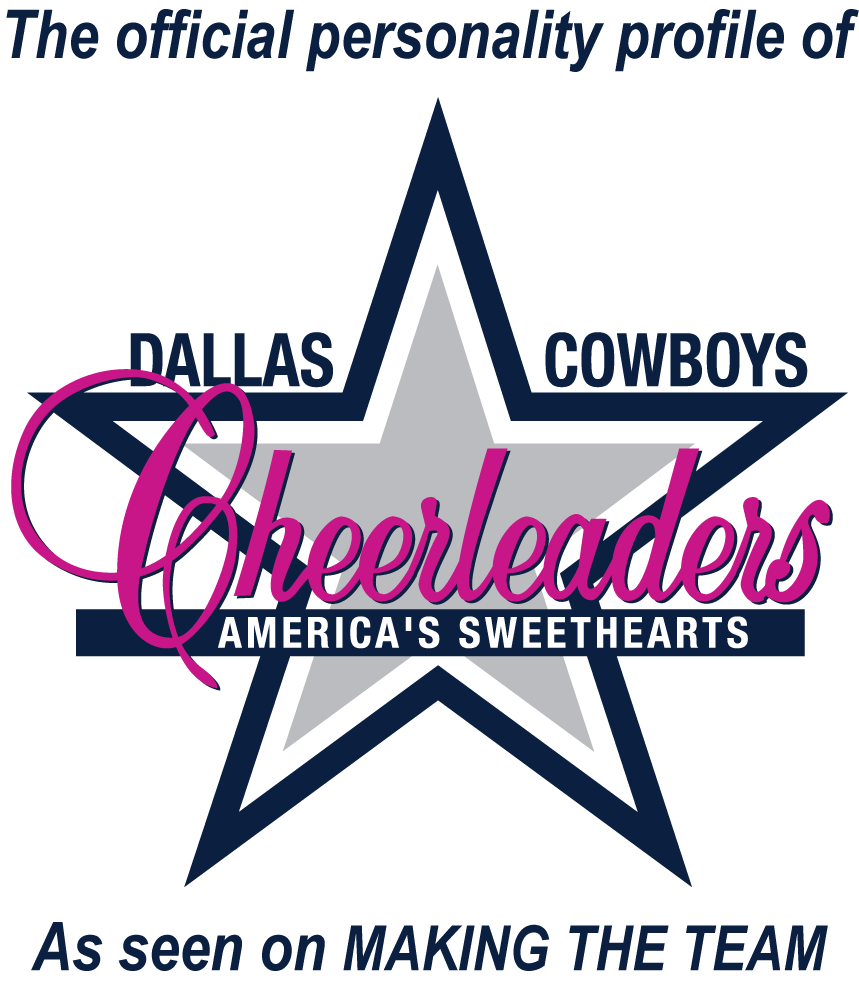Main Navigation
Self-Improvement
The first tool for gaining confidence is knowledge. Knowledge of your own strengths and limitations, and knowledge of the arena in which you wish to excel. But knowledge alone isn't enough. Knowledge leads to confidence only when it is validated by experience. We test the validity of what we think or believe by putting the theory into actual practice and gathering data or feedback from the experience. If the feedback is positive, we assume our theories are correct and act accordingly. If the feedback is negative, the bold among us will adjust our course, while the more timid often allow the negative feedback to stop them cold.
Confidence can be gained by knowing, understanding and correctly applying the following formulas and factors :
- Knowledge + Experience + Positive Feedback = Confidence.
- Positive feedback comes from successful outcomes.
- Successful outcomes are the result of consistent practice and repeated attempts.
- Repeated attempts are possible only when we believe we will eventually succeed.
The formula seems to say that we must believe in our ability to succeed before we have experienced any semblance of success, and that is true. That's where the knowledge part of the confidence formula comes in, and why it is the first equation in the formula. Before we can believe we will succeed without ever having made an attempt, we must have some knowledge as to what success entails and what strengths and abilities we bring to the mix. We must also know the truth about "failure".
Failure is not the result of attempting to achieve a goal and falling short of the mark. Failure occurs when we allow falling short of the mark to cause us to quit trying. Actually, there are only two ways to fail. (1) Give up before you reach a goal you really want or (2) continue on a path that is wrong for you because you made a wrong choice initially and believe the erroneous choice is the one you must stay with.
Suppose, for example, you got into your car intending to meet a friend at an unfamiliar location. You get turned around on the way there and get lost.
In failure formula number one you discover you are lost and attempt to correct your course. However, you are too far off course for just one correction to get you back on track, so you make another correction and another one. After three or four corrections you decide you will never be able to find your way, so you give up, park your car, and never reach your destination.
In failure formula number two you decide that even though you made a wrong turn, you must stick with it because to make a new choice would mean you failed when you made the original decision that got you lost. So you continue down the wrong road, knowing it's wrong, but refusing to make an alteration because you've already made a choice, however wrong it may be.
Both scenarios sound pretty absurd in that context, but the world is full of people who people give up and quit before reaching their goal, and who stay with bad choices long after they have discovered they are bad.
To ensure success you must be willing to alter your course and keep altering it, and to try again and again, as many times as it takes, to reach your destination. Whether you reach it or not will depend on your belief in your ability to eventually arrive, and that brings us back to the confidence formula.
The faith to keep trying ultimately comes from knowing yourself and your abilities, and knowing how to use them most effectively. In the hustle-bustle of today's world, we sometimes forget to take a thorough look at our most valuable asset . . . ourselves. Only with self-awareness and understanding can we come to believe in our ability to find the right solution and to arrive at our goals.
People who don't know themselves are easily side-tracked. They have no well-defined personal boundaries and no center of power. A thorough and accurate self-assessment can provide the compass we need to get and stay on track. Without a center of power and personal boundaries to guide us, there is no way we can achieve our goals because there is no way to know for sure what our goals are, or should be.
Happy, centered, well-directed people are people who know their own core being and honor it. These are the people who have the basic tools to attempt new things, to set new goals, to persist in pursuing them. These are the people who succeed. They succeed because every achieved goal increases their faith in their ability to succeed and enables them to try greater and greater things. The happy result is a high degree of self-confidence and, with sufficient self-confidence, success is certain.
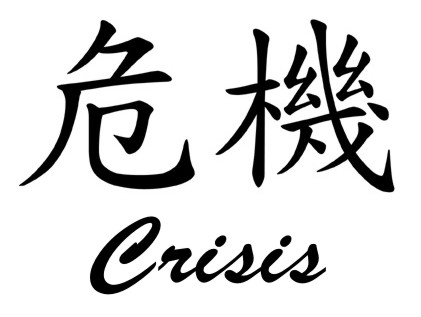
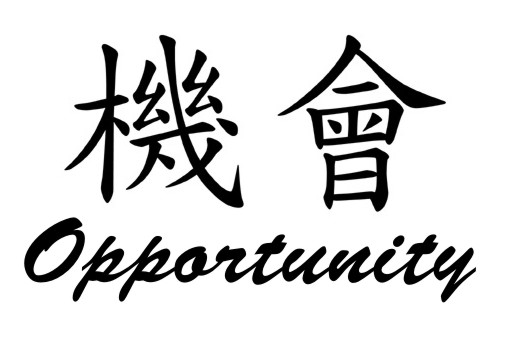
Notice that the symbol that makes up the last half of crisis is identical to the symbol that makes up the first half of opportunity. Here is what the ancient Chinese people were conveying:
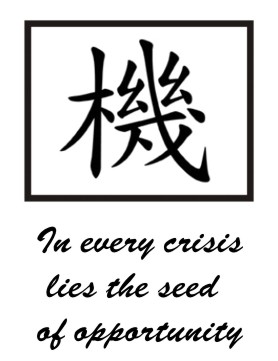
One benefit of meditation is that it places us in a receptive state and opens the mind so we are better able to listen to our deeper wisdom. So, although the thoughts of my difficulties were distracting me, the meditation was still conferring the benefit of deeper thought. As I pondered the challenges I had not managed to eliminate and questioned why they kept getting worse rather than getting better or going away, there came a response to my inquiry that I in no way expected. The response: “These are all opportunities. Why do you refuse them?” “Opportunities!” I mentally shouted, “How are these opportunities?” Then I remembered the old Chinese wisdom, “In every crisis lies the seed of opportunity.” And suddenly, that phrase was more than just words. It had meaning and I understood–really understood that we always have choices. We can choose to look at the problem or to search for the solution. We can choose to remain mired in the crisis or we can look for the opportunity every crisis brings with it; opportunity for growth; opportunity to expand our horizons, learn a new skill, gain new understanding, develop a new insight, meet new people, find a new and better way. Then the four words that make up the FOAM acronym formed in my mind, not just as a series of words, but as a set of directives to the subconscious mind. As a psychologist who is interested in brief therapy–and the briefer the better–I have spent twenty-five years studying the workings of the subconscious mind because that’s where all rapid, permanent change occurs. I have witnessed some seemingly miraculous transformations take place in people literally in minutes as a result of giving the subconscious mind the right information and the right instruction to work with. So I understood the power of these four words as directives.
The four words are: Focus, Opportunity, Abundance, Mine! (FOAM) The subconscious mind attends only to input from the senses; images, sounds, smells, tastes and touch. Touch includes everything that touches us, including emotions. The subconscious mind is not affected by words that have no sensory components or which are not charged by an emotion. Which is why statements such as “I need to lose weight” usually gets us just the opposite effect as that which we intended. The only words in that sentence with a sensory component or an emotional charge is NEED and WEIGHT. And since the subconscious mind is now focused on those two words, that’s what we get–automatically and effortlessly-need (generally for more food) and weight! To affect any change at the subconscious level, where it becomes automatic and effortless, all we need do is provide our subconscious mind with sensory charged input. And it doesn’t care whether the input is good or bad; positive or negative, it just takes it in and produces results. So sensory charged words must be carefully selected to ensure we get the results we want. With that understanding, lets look at the FOAM acronym. First, it is easy to visualize a picture of FOAM and see how a large quantity of it could cushion us from a fall or a blow. It is also easy to visualize FOCUS. We can imagine a laser beam or a magnifying glass that gathers the sun’s rays and focuses them onto one small spot so effectively and so intensely that the heat of that focus can start a fire; in this case, the fire of opportunity. If that laser-like focus is properly directed toward opportunity (the next word in the series) then OPPORTUNITY is what we find. Opportunity is a word that is emotionally charged. Most people feel it as positive expansiveness–a movement toward all that is desired or ABUNDANCE, which is the next word in the series. At this point, it is becomes necessary to know what abundance looks like for you. You can’t claim something you can’t see. But the first tool in the FOAM equation–focus– compels us to direct our thinking and narrow our choices to what is significant; to what holds the promise of opportunity, which creates a climate ripe for the discovery of exactly what abundance looks. Once we know exactly what our own personal version of abundance looks like, then all that is necessary is to claim that abundance right here and right now and that’s what the final word; that declaration of MINE! does.
Here’s how the subconscious mind translates FOAM: My FOCUS is OPPORTUNITY which leads to ABUNDANCE which is MINE right here and right now! The subconscious mind does not need all the words in between however. Those are just fill words that please the conscious mind, but add no value to the outcome and actually cause the declaration to lose power at the subconscious level. It is far more effective and powerful to simply know what the series is leading to and how, and then focus on installing the only words which the subconscious mind can interpret and work with: Focus. Opportunity. Abundance. Mine! Present these four words to your mind whenever you think about it and especially when you find yourself facing problems, challenges or moments of crisis. Think FOAM. Declare that your focus will be on opportunity, that abundance will be the result of that focus and that the outcome you want is already abundantly yours right now. What you will discover is that fear, dread and panic subsides and in its place comes calmness and clarity. You will find yourself beginning to look at difficult situations with the expectation of finding the treasures they contain–those wonderful seeds of opportunity. We almost always find what we expect to find and if you are expecting opportunity rather than problems, opportunity is what you will find. As more and more opportunities reveal themselves to you and you take advantage of them, you will find that you have more and more of the things you value in life. At some point you will discover that you really do have a nice cushion against life’s challenges and the last part of the FOAM equation will be your reality. You will be able to state with absolute certainty, abundance is mine!
With the exception of people who are very poor, research has shown little connection between a person's income and true happiness. In fact, people with great wealth are statistically no more or less happy than any other person on the average.
To achieve true happiness we must focus on three-dimensional success. The three major areas every human being must be accomplished in to feel truly successful are:
1. CAREER - Everyone must feel a genuine sense of achievement in their chosen field, whether they are a high powered CEO, a sales rep., a police officer, or a homemaker.
2. WORK - You must enjoy the work involved in your chosen field. Many people choose a career based on external factors... how much money they make, prestige, social approval, etc. However, if you don't enjoy the work itself, you will never be truly happy, no matter how "successful" you appear.
3. PERSONAL LIFE - Many people believe that in order to be successful, you must sacrifice your personal life. And while certain sacrifices may be required on occasion, you should always strive to live by the motto, "Don't get so busy making a living, that you forget to make a life."
So, how do you successfully combine these three areas to WIN at Life's Lottery?
Live by the "AAA" No-Fail Formula
Attempt an outcome
Assess the situation -
if you are on course continue on, if not
Alter the course you are taking
Don't think of setbacks as failures, but as learning opportunities. Have the courage to take necessary risks and allow yourself the freedom to alter your course when needed. The only way you will ever fail in life is if you give up trying or you refuse to see when you are on an erroneous course and won't change direction. Stay focused and enthusiastic
Truly successful people have clear goals and a sense of purpose, and they pursue their goals with enthusiasm and confidence.
Be sure your goals are your own Understand who you are and what you really want in life. Many people go their entire lives not knowing what they want... they live by other people's "shoulds" and "ought tos" without questioning what is right for their own happiness.
When you know yourself completely... when you can let go of other people's expectations and moralities...when you find your own true path, then you will be on your way to true happiness.
Remember . . . in Life's Lottery, the winning ticket is YOU!
The Five Essential Factors
Twenty-five years of research into the differences between successful people and those who struggle to improve their circumstances, but never manage to reach their goals, has led me to one clear conclusion; wealth and success are not possible without the presence of the five essential factors identified in this article.
No matter how much you study the “how to’s” of success, you will never achieve it until these five factors are in place and developed to healthy levels. Without them you are either spinning your wheels (working very hard, but not getting very far) or simply gathering information and storing it away.
The good news is that the information you have gathered over the years in an attempt to become successful is wasted ONLY if you fail to develop these five essential factors. Once these essentials are in place, everything else you have learned can then be applied to whatever degree you choose to apply it and you will begin experiencing the successes you long for.
(1) A clear awareness of your TRUE nature. Few people think about self-awareness because it appears to be the most natural thing in the world. After all we live with ourselves twenty-four hours a day, seven days a week. We are privy to all our thoughts and feelings and all our secrets. Who could possibly know us better, right? Wrong. Research suggests that the majority of the population (84%) is not self aware enough to profile accurately. Why? Because conditioning begins for most people very early in life and continues to impact us in ways we rarely recognize. Most of us are so thoroughly conditioned as children that by the time we reach adulthood all we are able to see is the conditioned mask we donned as children in order to be accepted and acceptable by our family, our school systems, our society, our religion, our co-workers, etc., etc., etc.
If we believe the mask is our true self and make life decisions based on that false view, we often set ourselves up for a lifetime of struggle. Those who are functioning according to the conditioned mask rather than according to their true nature, are essentially swimming up the swift river of life, always struggling to keep up with the demands of the world, rather than floating gently down life’s river in accordance with their nature. To the degree that we have been conditioned away from our nature, life is difficult. To the degree that we are working with, rather than against, out nature, life is satisfying and joyous.
(2) The healthy development of your natural traits. In truth all traits available to human beings are available to each of us, but some traits are difficult to sustain. We can do anything we put our mind to, but we don’t enjoy or have energy around just anything. Our least preferred traits are effortful. They drain us of energy so we have a lot of resistance around them. The traits we most prefer naturally are easy to sustain over long periods of time. They actually feed our soul and generate huge amounts of energy, enthusiasm, motivation and drive. The graph below demonstrates this concept.
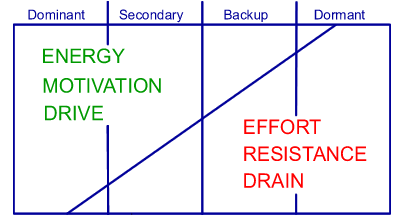
You have a whole brain and the capacity to use every part of it and I encourage you to do just that. But you only have so much energy to give and, if you are giving it to traits that drain you, a lot of energy is being wasted and you are likely not having much fun either. By discovering your true nature and knowing which traits energize you and which ones drain you, you can order your life in such a way as to have the greatest part of it be joyous and filled with positive energy.
Only through the healthy development of our natural traits and through using them in the right order can we tap into our genius and passion and develop Emotional Intelligence (EQ), the ability to cope with stressors effectively and to defer gratification in order to do the right thing in the moment.
Emotional Intelligence popularized by Daniel Goleman in his book by the same name has been shown to be the number one predictor of effectiveness in life and relationships. But EQ is possible only through the healthy development of naturally preferred traits and we cannot develop them until we are aware of what they are. For EQ to develop to really healthy levels all five of the factors presented here must be developed.
(3) Healthy Personal Boundaries. Healthy personal boundaries are not possible until we know who we are authentically. Healthy personal boundaries require that we know and can define who we are and who we are not, as well as what we are and are not willing to accept from self and others. Only when you are fully aware of who you are authentically, and what parts of your self-perception have been forced upon you by conditioning and erroneous messages, can you separate the two, lay claim to your truth and purposefully discard all the garbage others have heaped upon you over the years. Once you know who you are, where your passions lie and what you really stand for, it's much easier to determine your worth.
Once you have established your worth in your own mind you can more easily build and maintain the second part of your personal boundaries, that of determining what you will and will not accept from others. With good, healthy personal boundaries in place, the fifth factor begins to develop and grow. To have healthy personal boundaries, you must be able to define and articulate four things; (1) Who you are, (2) Who you are NOT, (3) What you will accept from yourself and from others and (4) What you will NOT accept.
(4) Self-Confidence. Self-confidence is the factor that convinces us that we are capable of achieving whatever goals we set for ourselves. Confidence around anything is a product of knowledge, experience and positive feedback and, without knowledge of SELF self-Confidence is not possible because we don't know who we really are or where we should be headed in life. Our internal compass is working; always pointing True North, but we don't know how to read it so are forever lost. And lost people are never truly confident.
Notice that the first part of the confidence formula (Knowledge + Experience + Positive Feedback = Confidence) is knowledge. Without true self-knowledge we cannot experience our truth and without experience we cannot give ourselves positive feedback or believe the positive feedback we receive from others. If you have ever tried to give a genuine compliment to someone who doesn't believe in their self, you know that they don't accept compliments very well. Many don't accept them at all. When others compliment them, they either assume the person is just trying to manipulate them or is too blind to see the truth. Without the ability to receive positive feedback from self or others, confidence is not possible.
(5) Self-esteem. Self-esteem is the factor which tells us we are worth whatever effort it takes to achieve our goals and realize our dreams. Self-esteem in combination with self-confidence is essential to success. We must believe that we are worthy of the continued effort that is necessary to keep moving toward our goals in spite of the trials and tribulations that life continues to present to us on a regular basis (self-esteem) and we must believe we are capable of getting past them (self-confidence).
Self-esteem; the belief that we are worth the effort, is absolutely essential for follow through. Without it we just buy the books, attend the seminars, buy the gym memberships, make the New Years resolutions and so on, but never follow through. We have to believe we are worth the effort or we won't keep making the effort. But we can't have self-esteem until the other four factors are in place.
We have to know who we are to determine where our passions lay (self-awareness). We must have our natural attributes developed and healthy to turn our passions into worthwhile goals (healthy development of natural traits). We must have the depth of awareness and strength of conviction to keep ourselves tracking authentically and to prevent the agendas of others from pulling us off course and derailing our efforts to achieve the goals we set for ourselves (personal boundaries). We must believe we can reach the goals we set before we will seriously pursue them (self-confidence) and we must know we are worth the effort (self esteem).
Once these five factors are in place, then having the particular knowledge that will help you successfully navigate your chosen path comes into play. AFTER; not before. If information on HOW to get rich or HOW to stay fit and healthy or HOW to have great relationships was enough, we could all just read a few good books and be everything we ever wanted to be. But, in spite of having hundreds of thousands of books, tapes, seminars, etc. at our disposal, most people never achieve success to anywhere near the extent they desire. The internal work has to be done first. If it isn't, you are just wasting your time and money.
Even people like Kenneth Lay and Jeffrey Skilling who rose to the top of Enron and made a fortune before the Enron scheme fell apart, had a strong sense of self, certain traits developed (though not likely healthy), personal boundaries that kept them from allowing others to infringe on them (never mind that they infringed on others), plenty of self-confidence and self-esteem. Clearly they believed they could pull off their scheme and that they were worth the effort, the money, the success, etc.
The Enron story also makes it perfectly clear that success is possible without principles such as honesty and integrity. Lay and Skilling appear to have been lacking in those values, yet they were, at least for a time, very successful. While principles and values may be optional, you MUST have the five factors outlined above. And it is my belief that to have true and lasting abundance, you must also have principles and values, such as honesty, integrity, generosity and consideration of others in place as well.
Principles and values are to abundance what nutrition is to the body. The human body can sustain itself for a very long time without nutrition, but if nutrition remains lacking eventually the body begins to break down, falls ill and dies. The same holds true for what appears to be abundance. The facade can be sustained for some time before the walls come tumbling down, but you can be sure that what you see on the outside really is just a facade. On the inside things are slowly (or perhaps rapidly) falling apart.
Absolutely every person you will ever run across that is truly successful has all five of the factors presented here in place. Every person who is unsuccessful has one or more of the essential five missing; sometimes all five.
To gain all five essential factors, you MUST begin with self-awareness. There is no other way to genuinely have the other four. And if you are not happy and content with who you are – not necessarily where you are in life – but who you are, you can bet that you don't have sufficient self-awareness. You don't know your authentic self. I can state that pretty safely, because everyone loves the self nature gave them. In 25 years of working with people I have never seen a single exception to that truth.
The only tool I know of that can get past the effects of conditioning and uncover an individual's true nature is the CORE Multidimensional Awareness Profile (CORE MAP). It is truly a MAP to the CORE of your being; to your authentic self. No other tool I have ever seen, and I have searched for 30 years, has the ability to do so much, so quickly and effectively. If you are not certain that you are functioning from your authentic self, you owe it to yourself to experience CORE MAP.
You have the formula now. The rest is up to you. Find your truth and your passion will become apparent. Find your passion and your motivation to realize it will drive you toward your goals automatically. Begin moving toward your goals and your sense of self will grow stronger and healthier because you will begin experiencing successes. As your sense of self grows stronger and your successes multiply, your self-confidence and self-esteem will increase and you will stop allowing the opinions of others to negatively impact you. It's a beautiful circle that begins with you (the real you) and results in your overall happiness and success.
Enjoy the journey!
 Professional Path
Professional Path